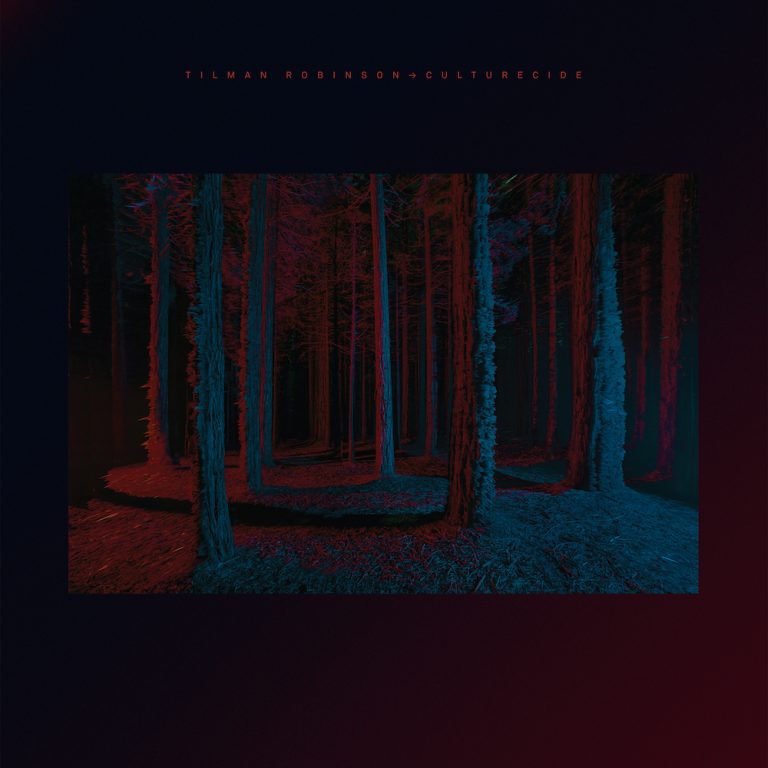In the absence of the daily capitalist grind, the planet is apparently healing. There are haze-free skies above Mumbai, wildlife is starting to reclaim spaces, and scientists are investigating links between air pollution and COVID-19. The Gaia hypothesis possibly needs more attention at this moment in time. Maybe we have been the virus on this planet all along.
Tilman Robinson’s third album is an aural thesis on the current geological epoch, the Anthropocene, a period marked by humankind’s significant impact of Earth’s geology and its ecosystems. When we started to fuck things up for ourselves, in layman’s terms.
CULTURECIDE was recorded in Australia, where climate change was dramatically evident in the bushfires that have now likely been eclipsed from our collective memories by the novel coronavirus. It is a tapestry of sounds from a wide array of sources – medical machinery, field recordings and synths – that provokes, delights and confounds in equal measure. Each track focuses on a particular socio-political issue with areas such as colonialism and neo-liberalism at the fore. Here, then, is an album that wears its high level of intellect proudly, but this does not make it impenetrable as a body of work. This is not just a highfalutin and overly cerebral body of work, it’s also a cracking album of sonic textures to get entirely lost in.
Opening track “Clathrate Gun” is an extraordinary piece of discordant and seemingly disassembled arpeggiated staccato blips that purposefully never quite mesh together. Eviscerating layers of sound are introduced at intervals, and fleetingly swamp the process of the stuttering and incessant synth notes, like waves unforgivingly crashing over an iridescent, tripped-out yet unperturbed Keith Emerson. “Clathrate Gun” utilises a melody based around a musical cryptogram of the Paris Accord, which just adds another level of ‘wow’ to the whole thing. It’s a skittish track, jittery and tangentially propulsive.
“We Came For Your Riches” is a soothing balm, by contrast. It starts with an asthmatic, wheezing machine noise before a swirling choir of distorted voices wail their ghostly incantations over the top. A funereal march is hammered out by metallic objects in the background, like the drums of an unflinching, inhuman army descending towards the beguiling lamentations of those already self-identifying as dead. It’s spooky, ethereal and relevant to the current condition we find ourselves in.
The sounds that Robinson creates are obfuscated, complex and with few obvious musical comparisons. There are tracks which use dynamic, glitchy and energetic experimental electronica, such as “Bartholomew, Glowing” and “Teach Me to Destroy You”, while others such as “Proxy War” and “Hayek’s Legacy (Instrumental)” use drones, neo-classicism and ambience to create otherworldly vistas of beauty and disquiet.
With the overall thematic content of the album centring on humankind’s elaborate and impending self-destruction, there is a palpable and perhaps obvious sense of pessimism on CULTURECIDE that is marked by a seeming lack of urgency, as if the damage has already been done and our collective fate sealed. Oxymoronically, it’s actually a comforting, even warm album, which is soporific rather than alarmist and overtly angst-ridden in nature. Others may hear it differently.
The drone tracks in particular envelope the listener, surrounding them in tones similar to those on the Sunn O))) and Ulver collaboration album Terrestrials or Lawrence English’s The Peregrine, as they work at both low and extreme high volumes, each allowing different enriching listening experiences. It’s little surprise to find that the album was mastered by English.
The sonic collages presented on CULTURECIDE are less menacing than the title would suggest, although “The Word for World is Forest” uses an ominous and downbeat cello to counter the rising optimistic tone of the mechanised tempo in the background, perhaps suggesting victory for the organic over the inorganic. Or perhaps the total opposite of that, as the track ends with the cello disintegrating into a mushy blur of static and disorientating distortion which is over far too quickly.
Therein lies the overall rub of the album – the tracks are all far too short, with none stepping over the seven-minute mark. This is a shame as by the end there’s a craving for more. Much more.
CULTURECIDE is up there with some of the best “challenging” works of recent times, such as Black To Comm’s astonishing dual releases of last year, or the consistently overwhelming work of Oren Ambarchi, Philip Jeck and Stephan Mathieu. It is an album of grace, complexity and unusual, disturbing serenity.

